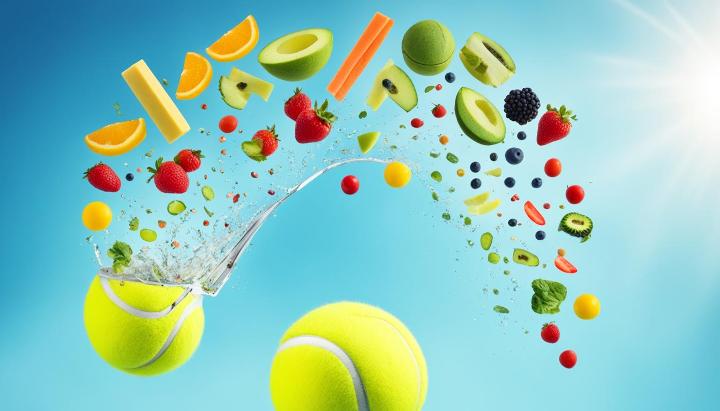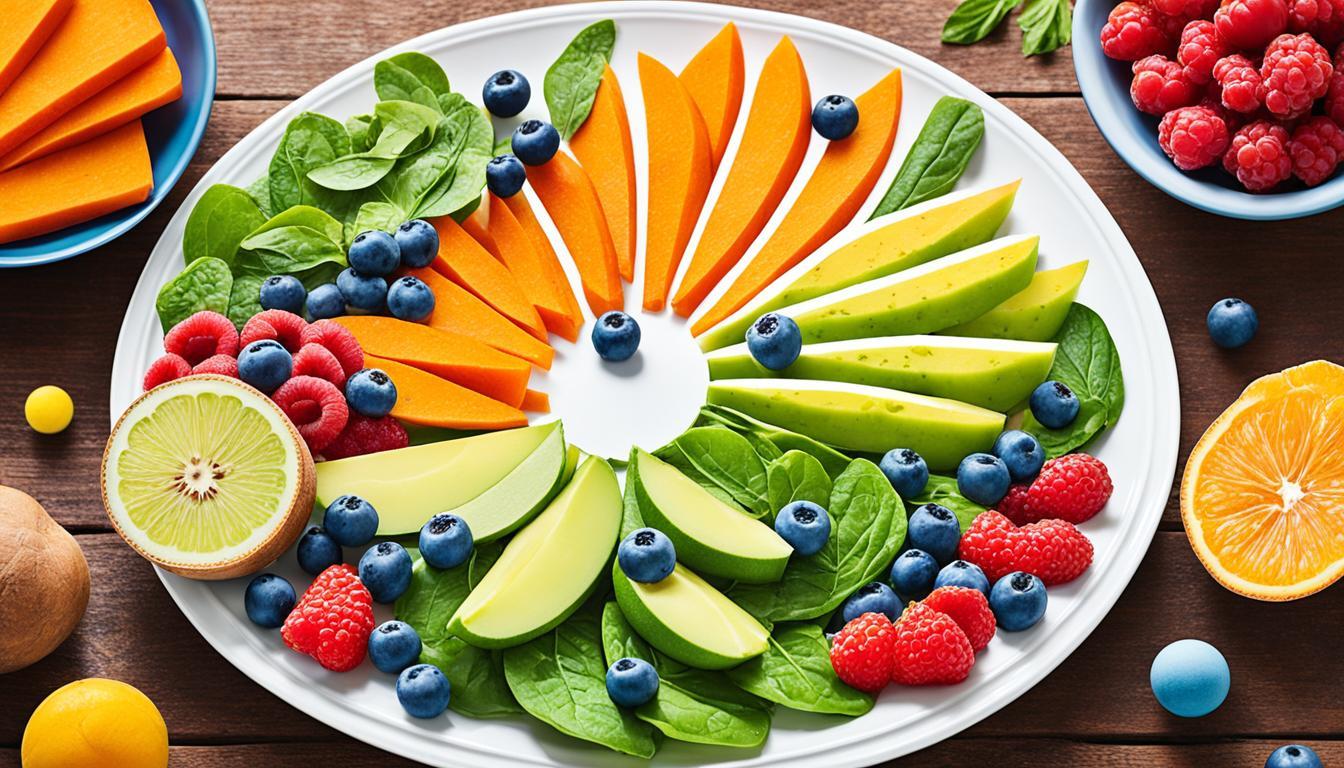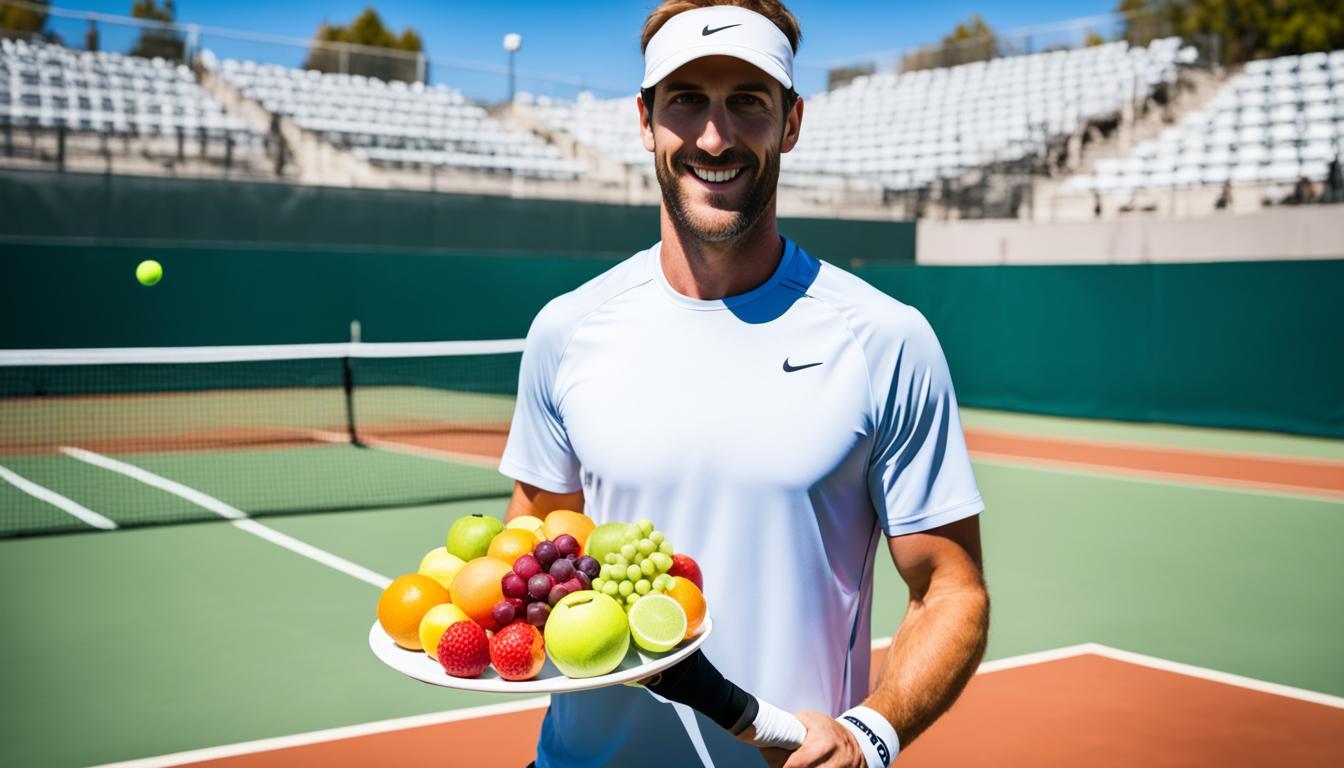Complete Nutrition Guide for Tennis Players

If you're a tennis player in the Netherlands, aiming to boost your game, this guide is for you. It's packed with info on how to fuel up, increase your energy, and help your body recover faster for top performance.
Tennis is all about high energy and endurance. It requires you to be fast, agile, and focused for long periods.1 During a 150-minute match, you could burn up to 1,700 calories.2 To keep up, pro tennis players might need 3,500 to 5,000 calories daily. The right nutrition is essential for athletes in the Netherlands to stay at their best and recover well.
Key Takeaways
Tennis is a high-intensity, endurance-based sport that requires comprehensive nutritional support.
Macronutrients like carbohydrates, protein, and healthy fats play a critical role in fueling tennis performance.
Proper hydration strategies are essential to maintain energy, focus, and prevent heat-related issues.
Micronutrients and targeted supplements can help tennis players in the Netherlands enhance recovery and boost performance.
Meal planning and preparation are key to ensuring tennis players have the right fuel before, during, and after matches and training.
Understanding the Importance of Nutrition for Tennis Players
Nutrition is key for tennis players. It helps them peak in performance and recover well. Good nutrition is vital for their game.
Impact of Proper Nutrition on Performance
Eating right gives players the energy they need. It helps with muscle recovery and overall performance. Good nutrition means better play3,4.
Unique Nutritional Demands of Tennis
Tennis is fast and intense. Players need a mix of the right nutrients and fluids. During play, they burn about 1700 calories every 90 minutes3. A high-carb diet is important to keep glycogen levels up. They should get 6-10 g of carbs per kilo of body weight every day4.
Protein is crucial too, around 1.6 g per kilo per day for those who train hard. They shouldn't forget their healthy fats, not more than 2 g per kilo daily4.
Staying hydrated is vital with tennis. Players sweat a lot, losing salt too. Their fluid needs change with different playing and weather conditions4.
Knowing what their bodies need and planning their diet can make a big difference for tennis players. It helps them perform better, recover faster, and stay healthy.
Macronutrient Requirements for Tennis Players
Tennis players rely on a mix of macronutrients to perform at their best. They need carbs, protein, and good fats. Getting the right mix helps with energy, muscle support, and staying healthy.5
Carbohydrates: The Primary Energy Source
Carbs are key for tennis and should be most of what players eat. The ideal mix is 70% carbs and 30% protein before playing.4 For the best results, tennis players need plenty of complex carbs. These come from whole grains, fruits, and veggies. They give lasting energy for long matches.
Protein: Building and Repairing Muscles
Tennis players must focus on protein to build up and repair muscles. The target is 1 gram of protein per kilogram of weight daily.5 If you train hard every day, you should aim for about 1.6 grams of protein per kilogram of weight.4
To hit these protein numbers, eat lots of lean meat, fish, and eggs. Plant-based proteinsfrom beans and nuts are also good.
Healthy Fats: Supporting Overall Health
Healthy fats are crucial for tennis, even if they're not the main energy source. Players should aim for less than 2 grams of fat per kilogram of weight each day.4 Foods rich in good fats, like avocados, nuts, and olive oil, support health and recovery.

Nutrition Guide for Tennis Players
We know that eating right is key for tennis success. This nutrition guide helps us eat well for5 peak performance and4 manage our energy during practice and games.
A good pre-match meal should be5 70% complex carbs and 30% protein. This mix gives us lasting energy and helps our muscles recover. After playing, aim for 50% carbs, 40% protein, and 10% healthy fats.
Getting enough protein is vital too. Aiming for about 1 gram per kilogram of our weight daily helps our muscles grow and fix. If we practice a lot, like many tennis players do, we should up this to about 1.6 grams per kilogram each day.
Besides balancing our meals, eating foods rich in nutrients is crucial. For example, beets are great since they can boost our staying power by up to 16%. This is thanks to their high levels of nitrates. And don't forget chia seeds, which are packed with fiber. They help slow down how fast our bodies absorb sugar and keep us hydrated too.
Staying hydrated is just as important as what we eat. Drinking 500 milliliters before we start training, then another 500 milliliters during, helps. Afterwards, we need at least 1 liter of water. During play, we can lose a lot of fluid through sweat. In tennis, drinking about 200 milliliters of an electrolyte drinkat each break is a good move.
By finding the right balance in our meals, focusing on macronutrients, and staying hydrated, we can prepare our bodies for the demands of tennis. This approach helps us perform better, recover faster, and stay energized for every game and practice.

Timing and Portions: When and How Much to Eat
Eating at the right time is key for tennis players. They need to plan their meals around matches and training. This helps keep their energy up, improves how they play, and speeds up their recovery.
Pre-Match Fueling
Before a match, it’s crucial to eat a balanced meal or snack. This should be mostly complex carbohydratesand some quality protein. Aim to have it 2-3 hours before you start playing tennis. This mix gives you energy that lasts during the match.6
During-Match Refueling
While you play, your snacks should be small and easy to digest. This keeps your energy steady without feeling too full. Good options include fruits, granola bars, or sports gels. They’re fast to consume and use.6
Post-Match Recovery
After the match, refueling with carbs, protein, and a little fat is important. This mix helps your body build back its energy stores and fix your muscles. The best time to eat this meal is within an hour of finishing playing.6
Remember a few other things too. Every day, make sure to eat about 1g of protein for each kilogram you weigh. And always drink enough water: 500ml before you start moving, 500ml while you play, and at least 1L after you’re done.5
Looking after what you eat and when you eat it helps you play tennis better. It lets your body get all the fuel and rest it needs, so you can shine on the court.
Hydration Strategies for Tennis Players
Staying hydrated is key for tennis players to perform well and avoid health problems. The sport is tough, needing a lot from players' bodies and minds. Keeping the right level of hydration helps them play their best.
Importance of Proper Hydration
Tennis makes players sweat a ton – they can lose 2.5-3 liters of water an hour, especially when it's hot. Some could even lose 5 liters an hour.7 The level of salt in sweat can be different for each person. This affects how quickly they get tired, how dehydrated they get, and if they'll cramp.7 Knowing how salty your sweat is can help make a hydration plan just for you.7
Sometimes, players need to drink up to 200 ml of special fluids every quarter-hour during the game if it's not too hot. But, in really hot weather, or if you sweat a lot, you'll need more.7 If you get super thirsty, aim to drink 1.5 times the amount of fluids you've lost.7 This will help you get back in shape faster.7 You should also keep plenty of fluids and snacks close by during a game or practice.8
In fact, it's good to have at least 2 liters of drinks near you on the court for every game and practice.8
Micronutrients and Supplements for Tennis Players
Tennis players must get enough macronutrients like carbs, protein, and good fats. But they also need to focus on getting the right vitamins and minerals. Supplements can help meet their high-energy needs for the sport.9
Essential Vitamins and Minerals
Essential vitamins and minerals are key for energy, muscle work, and staying healthy. About 20% of people might have trouble using vitamin B9. This can affect energy and focus.9
Iron is very important for energy and is often low in female tennis players.9 Zinc aids in hand-eye coordination and is lost through sweat. This makes it vital for those on the tennis court.9 Women in tennis also need good calcium intake to keep their bones strong and prevent cramps.
Potential Beneficial Supplements
While eating a diet packed with nutrients is crucial, supplements can also help. Caffeine at 3 mg·kg-1 can boost performance during matches.4
Tennis players playing for more than 90 minutes should aim for 30-60g of carbs every hour. This helps maintain peak energy levels. The right supplements can also meet protein, carb, and nutrient needs to assist in recovery and support the muscles.
By making sure they get the right vitamins, minerals, and supplements, tennis players can perform better and recover faster. This is important for staying strong throughout their games and practice.
Meal Planning and Preparation for Tennis Players
Being tennis players, we know what we eat is crucial for playing well and recovering. Eating the right food can boost our game and health. Here are some meal and snack ideas for our tennis journey.
Balanced Meal Ideas
It's key to have meals that balance out carbs, proteins, and fats.5 Here are some meal ideas that hit the spot: - Rolled oat porridge with nut butter, coconut cream, and berries - Berry and banana smoothie with chia seeds and nut butter - Sourdough toast with smashed avocado, spinach, and a cooked egg - Chicken and salad sandwich on sourdough or whole grain bread - Beef and vegetable lasagna with a side salad - Tuna and salad wrap - Beef and bean burritos with salad - Teriyaki salmon stir-fry with vegetables - Chicken meatballs with sweet potato and broccoli
Snack Options for On-the-Go Fueling
Eating healthy snacks is also important for keeping our energy up and aiding recovery.5 For a quick bite, consider: - Crackers and cheese - Beetroot and apple juice - Piece of fruit or banana with peanut butter - Plain popcorn and coconut water
By making and choosing nutritious meals and snacks, we can power our tennis game and health.10,11
References:
- https://veloforte.com/blogs/fuel-better/tennis-nutrition-diet
- https://levosports.in/images/Article/5_Andy_TENNIS_NUTRITION.pdf
- https://www.pop-tennis.org/post/nutrition-for-tennis-players
- https://www.ncbi.nlm.nih.gov/pmc/articles/PMC3761836/
- https://www.tennisfitness.com/blog/tennis-nutrition
- https://www.sportingbounce.com/blog/sports-nutrition-for-tennis-players
- https://www.precisionhydration.com/performance-advice/hydration/tennis-hydration-fueling-recommendations/
- https://www.goldenocala.com/blog/fitness/nutrition-and-hydration-tips-for-tennis-players/
- https://www.nutri-genetix.com/en-us/blogs/ngx-blog/nutrition-for-tennis-players-what-you-need-and-where-to-get-it
- https://www.itftennis.com/media/2300/health-planning-meals.pdf
- https://www.sportsdietitians.com.au/factsheets/food-for-your-sport/food-for-your-sport-tennis/